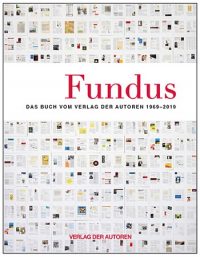
Newsletter July 2019

On 20 May, the Fassbinder Center opened its doors to the public for the first time as part of the celebrations marking the seventieth birthday of the Deutsches Filminstitut (DFF). The center is providing a new home for not only almost all of the filmmaker’s artistic estate but also many other archive holdings, such as those donated by director Volker Schlöndorff and producer Artur Brauner.
Writing in the Frankfurter Allgemeine Zeitung, Eva-Maria Magel details the advantages of the new building; “Over 1000 square meters are available to present the material held by the DFF, which was previously stored at several different locations. […] The basement level, which allows in plenty of daylight, now houses generous working areas for the staff led by archive director Peter Reichmann and, above all, a large and well-lit reading room on the mezzanine floor, which offers an optimal atmosphere for engaging with the material on offer.” (The entire article can be read at: https://www.faz.net/aktuell/rhein-main/das-neue-fassbinder-center-oeffnet-in-frankfurt-16194828.html DE)
Oliver Camenzind, who also writes for the FAZ, has taken a closer look at the Fassbinder archive: “You can find A4 pads with writing in pen on both sides of the pages – one script on the front pages and another on the back pages. Another writing pad is around half-filled with the original script for “Fear Eats the Soul,” which had the working title ‘Ali’ […]. There are virtually no changes to the text. The director had the film in his head and only needed to write it down and shoot it.” The primary role envisioned for these documents is to “improve our understanding of Fassbinder’s obsessive work methods.” (The entire article is available at: https://www.faz.net/aktuell/feuilleton/kino/fassbinder-center-ein-neuer-ort-fuer-den-deutschen-film-16207265.html DE)
David Steinitz (Süddeutsche Zeitung) draws attention to the archive’s audio documents as indicating the extent to which Fassbinder’s way of working was shaped by his enormous output: “Because things never moved fast enough for the obsessively working Fassbinder, at some point he found it took too long to write out his own scripts. Instead he dictated them partly onto tape.” Some of the filmmaker’s work tools are now part of the collection, including “the Interfunk 976 tape recorder he used to record his ideas for the filming of ‘Berlin Alexanderplatz’,” and “the Triumph typewriter Fassbinder’s mother used to type out what her son dictated.” (For the complete text see: https://www.sueddeutsche.de/kultur/fassbinder-center-frankfurt-nachlass-1.4455906 DE)
A personal tour by RWFF president Juliane Maria Lorenz can be found in the Bild-Zeitung. She reveals not only what her favorite archive pieces are but also Fassbinder’s favorite recipe: https://www.bild.de/lifestyle/kultur/kultur/rainer-werner-fassbinder-er-liebte-japanisches-essen-und-apfeltaschen-62318670.bild.html DE
2019 marks an anniversary not only for the Deutsches Filminstitut but also the Verlag der Autoren. It is 50 years since the founding of the democratically organized publishing house, one of whose first members was Fassbinder. From the beginning, the VdA saw itself as a home for young authors. Speaking with the radio broadcaster Deutschlandfunk Kultur, cofounder Karlheinz Braun recalls: “The experiment, if you want to call it that, consisted above all in changing the prevailing ownership structure, in the struggle for codetermination. […] The enthusiasm that greeted the new publishing model in the cultural scene was astounding.” (The entire report is available at: https://www.deutschlandfunkkultur.de/50-jahre-verlag-der-autoren-mit-enthusiasmus-gegruendet.932.de.html?dram:article_id=443223 DE)
In a speech he gave on 14 June at the anniversary celebrations for the Schauspiel Frankfurt theatre company, Wim Wenders described the VdA as shaped by its founding years and yet modern at the same time. With “its flat hierarchies and transparent, cooperative structures,” he said, the publishing house remained as “inspiring and worthy of imitation […] as it was then.” (The entire text of the speech can be read at: https://faustkultur.de/3964-0-Wim-Wenders-50-Jahre-Verlag-der-Autoren.html DE).
The anniversary is also being marked by the publication of the book “Fundus,” for which the editors Marion Victor and Wolfgang Schopf have collected quotes, excerpts, facsimiles and photos from the publisher’s archive, which they see as reflecting “the political and aesthetic debates and changes taking place over a half a century in West Germany.” The book can be purchased, among other places, at: https://www.verlagderautoren.de/buchverlag/buch-shop/buch.html?book=9955 DE).
We will now take a break for the summer. We wish all our friends and readers a relaxing time and will return in September with more news from the world of Rainer Werner Fassbinder.
Photo left: Archive space in the Fassbinder Center © Uwe Dettmar
Photo right: “Fundus” book cover © Verlag der Autoren